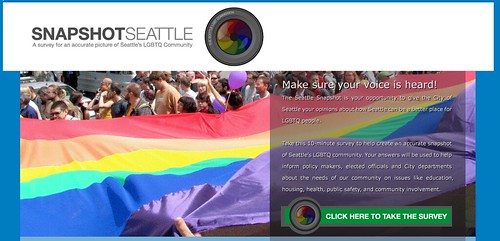
For its 2010 survey, the Census Bureau made a big push for LGBT participation complete with Capitol Hill giveaways and rainbow-covered signage. This month, the Seattle LGBT Commission launched a 2010 survey of their own, which the group hopes will give them a greater lens into the local gay and lesbian community that they can share with the City Council and other government agencies, to better meet the needs of that population.
You can view and take the survey at www.snapshotseattle.com now through the end of July.
“The City of Seattle has never before undertaken this type of comprehensive needs assessment for Seattle’s LGBTQ community, nor have we attempted to develop City government strategies to meet those needs,” said Michael Jerrett, legislative assistant to City Council member Bruce Harrell. “With the feedback and data from the survey, the LGBT Commission can figure out what’s going on in the community and where the City can better partner with other organizations to make improvements.”
The anonymous survey addresses overall quality of life, topics include housing, ethnic background, education, employment, personal health and social life. It also asks the surveyor their opinion on the greatest issues facing their community today, and asks their levels of involvement in civic engagement and political leanings.
“As far as realistic expectations for outcomes, it is a very difficult question, given that we don’t know what issues are going to be identified,” said Lillie Cridland, co-chair of the LGBT Commission. “The results could be quite effective in helping the Commission and nonprofit organizations lobby to preserve funding for programs if the survey indicates a clear need for certain services.”
The Commission will study the information and use it to identify trends in the local lifestyle and could potentially identify areas of need that they will then share with the public, by as soon as September or October.
Once it’s published, anyone will be able to access the results online.
“I think what makes it unique for us is that the Commission doesn’t stand to benefit in any tangible way from the results. Of course it’s rewarding and our work will be better because of it, but we’re not getting any thing material out of it,” said Cridland. “Our interest is simply in making life better for LGBTQ people living, working or playing in Seattle. I think that gives us a unique opportunity to get an accurate ‘snapshot’ of the community today and it’s helped build cooperation across different organizations.”
The LGBT Commission is a government group that advises the Mayor, City Council and other departments about sexual minority issues, advises them on policy and legislation and works to bring the overall LGBTQ community together.
The benefit local groups could receive from the data could benefit the community for years to come, with the potential for policy change in the future.
“I think we’re all aware that this is not an economy where adding programs or expanding funding is realistic. Where we do see gaps that might require new programs or funding, organizations can beginning planning for that now so that they’re ready to hit the ground running as soon as we start seeing more economic growth,” said Cridland. “The specific example for that could be something like a new LGBTQ Center which is likely to be a few years in the making but we can begin laying the ground work now.”
City Council’s Resolution #31224 mandates that Seattle City government must work with the Seattle LGBT Commission, nonprofit organizations, businesses and associations to address the issues raised in the survey.
“Results of the survey could result in changes to City policies and within the larger community in order to better address people’s situations,” said Jerrett.
The LGBTQ Commission is not the only gay rights organization conducting a LGBT population survey. Gay City recently launched Count Me Out, which they’ve launched in partnership with King County. The statistics they glean will help address “health inequities” the gay community may face.
“Seattle has the third largest percentage of gay, lesbian or bisexual residents among large cities in the United States. We have abundant evidence of the LGBTQ community’s specific concerns in areas such as health and medical care, civil rights, education and public safety. But we don’t know how those pieces fit together for this segment of our community,” said Jerrett. “For LGBT people in Seattle, the streets may not be as safe, medical care may not be as certain, and housing and employment rights are not something to be taken for granted. This survey is an important first step to addressing those needs.”
Access the LGBTQ Commission survey at www.snapshotseattle.com and the Gay City health survey at http://countmeout.gaycity.org.


